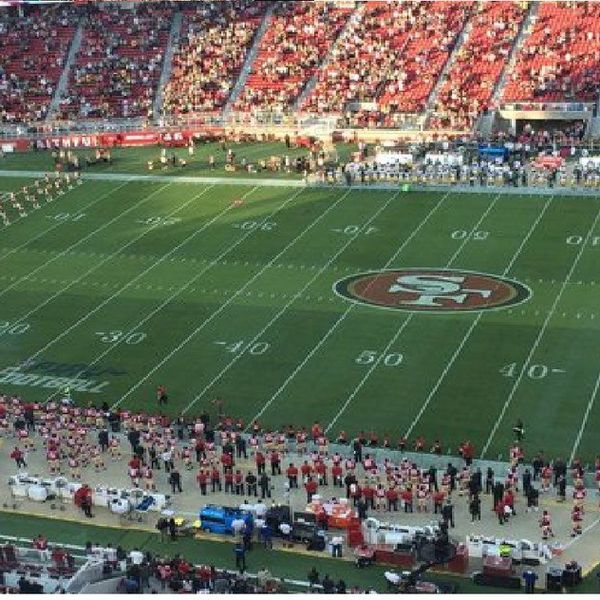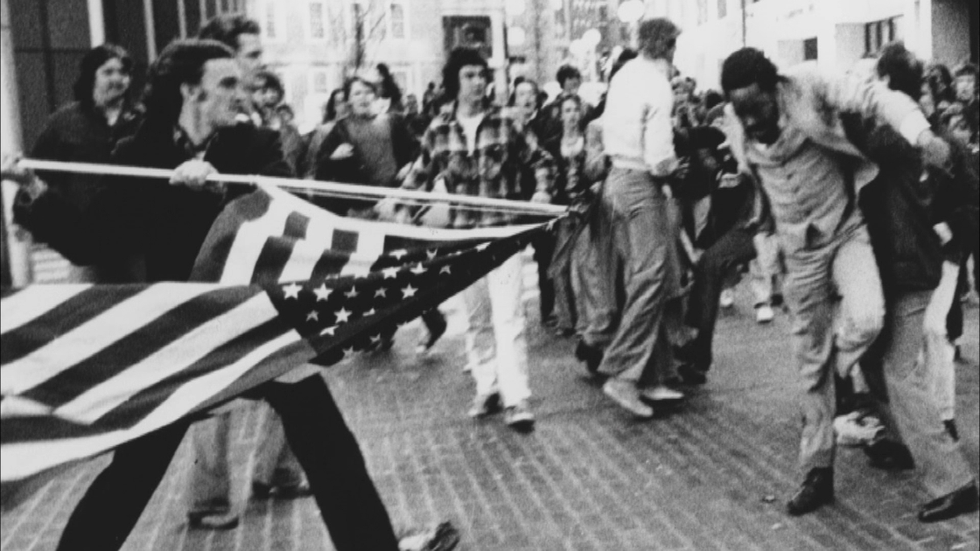It all began with an unnoticed decision to sit during two preseason ceremonial performances of our National Anthem on August 14th and August 20th. But by August 26th major media outlets had taken notice and our country had a new issue to mull over. Colin Kaepernick—San Francisco 49ers former starting Quarterback—has ignited quite the inflammatory debate within recent weeks: Should constitutionally granted freedoms be protected even when the actions they encompass are perceived to be disrespectful? Are our nationalist symbols—such as the flag and anthem—so sacred that they require unquestioned respect from all observant parties? What is the relationship between unfettered nationalism and our constitutionally granted civil liberties?
On August 28th, Kaepernick met with journalists to explain his actions in further detail saying:
“I have great respect for the men and women that have fought for this country. I have family, I have friends that have gone and fought for this country. And they fight for freedom, they fight for the people, they fight for liberty and justice, for everyone. That’s not happening. People are dying in vain because this country isn’t holding their end of the bargain up, as far as giving freedom and justice, liberty to everybody. That’s something that’s not happening. I’ve seen videos, I’ve seen circumstances where men and women that have been in the military have come back and been treated unjustly by the country they fought have for, and have been murdered by the country they fought for, on our land. That’s not right.”
The demonstration, according to the athlete, is intended to spark a national conversation about social/racial injustices in the U.S. and to shed light on the frequently reported—yet infrequently condemned—incidents of police overreach. Many veterans, as well as active duty servicemen, have voiced their support for Kaepernick’s actions using the hashtag #VeteransForKaepernick. Other public figures such as Barack Obama, Jesse Ventura, J Cole, Megan Rapinoe, and John Legend also expressed their support for the protest.
However, many others have been adamantly vocal in their opposition to the demonstration. The Santa Clara Police Officers Association threatened a boycott of its members if the 49ers fail to discipline Kaepernick, citing the protest as a threat to the “harmonious working relationship” with the team. This development opens another intriguing conversation: Should officers of the law be entitled to choose who they do, or do not, protect? Is that not, at least in part, a key portion of Kaepernick’s argument—that government officials can pick and choose which individuals they represent, and therefore, protect? Should public servants be required to protect and serve all equally, without regard to one’s personal beliefs? Others who have voiced opposition include Jerry Rice, Trent Dilfer, and presidential candidate Donald Trump.
With all of this being such a hot-button issue, it’s important to note that back in November of 2015, a 145-page report unveiled by two Senate Republicans—John McCain and Jeff Flake—found that the Department of Defense (DOD) shelled out close to $6.8 million of taxpayer money, or “Defense Funds,” to professional sports teams to ‘honor’ the military at games over a four-year period. The New Jersey National Guard alone contributed nearly $115,000 to the New York Jets in order for the team to recognize soldiers present at games! According to the Huffington Post, “The NFL’s Atlanta Falcons took more money from DOD than any other professional sports franchise. From 2012 to 2015, the Falcons received $879,000 from the Georgia Army National Guard for assorted promotions”.
The report goes on to state, “Given the immense sacrifices made by our service members, it seems more appropriate that any organization with a genuine interest in honoring them, and deriving public credit as a result, should do so at its own expense and not at that of the American taxpayer…”. From 2012 to 2015 the DOD spent a whopping $53 million on marketing contracts with various sports teams. The Senators referred to this “inappropriate” allocation of taxpayer funds as “patriotism for profit”. Paid patriotism, in many ways, is a polite term—perhaps a more appropriate word would be propaganda. Nationalist displays which foster particular political causes using tactics to sway, or mislead, should always be deemed propaganda. It is, at best, misleading to demonstrate a spectacle of patriotism at the taxpayer’s expense. If the NFL—a franchise worth upward of $2.3 billion, with a collection of wealthy owners and players worth nearly $66 billion—wished to honor the men and women who serve this nation they could, in theory, afford to do it on their own dime. The typical American taxpayers is, in actuality, forking out their hard earned cash annually to argue over whether or not Colin Kaepernick should be allotted the right to sit during pregame national spectacles. So now, tell me, what is more disrespectful: a man using his constitutionally granted civil liberties to shed light on social issues, or, the fact that the DOD is squeezing funds from under the noses of the American populace to purport an image of national reverence whilst using our servicemen (and women) as a means to its own end? I’d argue the latter.
Kaepernick’s protest has gained traction in recent weeks. He has been joined by other professional players like Eric Reid, Jeremy Lane and Brandon Marshall, and many students playing at the high school level are also following suit. Coach Preston Brown and a majority of participating student-athletes from Woodrow Wilson High School of Camden County, NJ, chose to kneel prior to the start of their football game on September 10th. This occurrence led to a flurry of conversation regarding the degree of power schools have to sway, or impede, student action. The Superintendent of Schools for the Diocese of Camden, Mary P. Boyle, sent a letter to institutions within her jurisdiction saying, “…let me be clear. We are not public institutions and free speech in all of its demonstrations, including protests is not a guaranteed right. Failure to do demonstrate appropriate respect, will result in suspension from play (2 games) or dismissal from the team for subsequent offenses”. According to Jeanne LoCicero of the New Jersey chapter of the American Civil Liberties Union, “Private schools are non-government entities and they have a much wider range to enact regulations over student conduct and expression…”. Woodrow Wilson High School is a public institution and its students are protected by the right to freedom of expression and protest.
The New Jersey Principals and Supervisors Association easily clears things up. “Students, like Kaepernick, have the right to refuse to stand for the National Anthem or the Pledge of Allegiance, provided that they are exercising a mode of symbolic free expression and are not intending to be disruptive”. Students attending public institutions cannot be forced to stand at attention for the Pledge of Allegiance, or for the National Anthem. In 1943 the United States Supreme Court ruled that requiring all pupils to salute the flag was inherently unconstitutional. “A salute of the flag is a gesture of love and respect . . . fine when there is real love and respect. The flag is dishonored by a salute by a child in reluctant and terrified obedience to a command of secular authority which clashes with the dictates of conscience”. Taking all of this into account, is it appropriate for a private institution working within the parameters of a free state to infringe upon the constitutional rights of its student body? To use the wise words of Eric Andre, maybe, “Freedom ain’t not free”.
In summation, if the Kaepernick debate has done nothing else, it has effectively highlighted the dichotomy plaguing American popular culture. The NFL can get away with neglecting seriously impaired retired players, the organization can mishandle cases of domestic abuse, the NFL can lie for decades about the connection between football and neurodegenerative diseases… but if one player chooses to use his platform to express an ‘unpopular,’ or, ‘controversial’ message, dedicated fans lose their minds, and threaten to boycott the franchise. When did our nationalist agenda become so all-encompassing that even our own freedoms threatened the sanctity of our national symbols? Why are the individuals who decry the notion of political correctness—when it’s convenient—so adamantly condemning the actions of an athlete? I cannot recall ‘fans’ burning the jerseys of Ray Rice after video surfaced of the athlete punching, and then dragging the unconscious body, of his then fiancé. Michael Vick was welcomed back to the NFL after serving 23 months in federal prison for his role in a dog fighting organization. Ray Lewis—who was accused of murder but reached a plea agreement by testifying against two other conspirators—still frequents ESPN to provide gleeful commentary on current NFL issues. It seems as though many have either forgiven these men, or forgotten their troubled histories all together. Why does the same American conscious, and notion of morality, that is so intertwined with national reverence, remain silent when it comes to acts of rampant violence? Why is an act of peaceful protest garnering more criticism than the criminal conduct of players in the same league? If the observation weren’t so bothersome, it may actually be comical. Colin Kaepernick is pledging $1 million to charities working to improve racial tensions in the U.S. and in the upcoming weeks I look forward to monitoring the evolution of this cause. My 'final thoughts': please attempt to realize the world--the real world, and it's expansive tribulations-- is bigger than the window through which you allow yourself to see.
Sources:
http://njpsa.org/flag-salute-rights-and-students-and-schools/
http://nj1015.com/protest-the-national-anthem-that-wont-be-allowed-at-our-school-coach-says/
http://1057thehawk.com/nj-high-schools-will-suspend-athletes-who-dont-stand-during-national-anthem/
http://law.justia.com/cases/new-jersey/supreme-court/1966/46-n-j-281-0.html





















